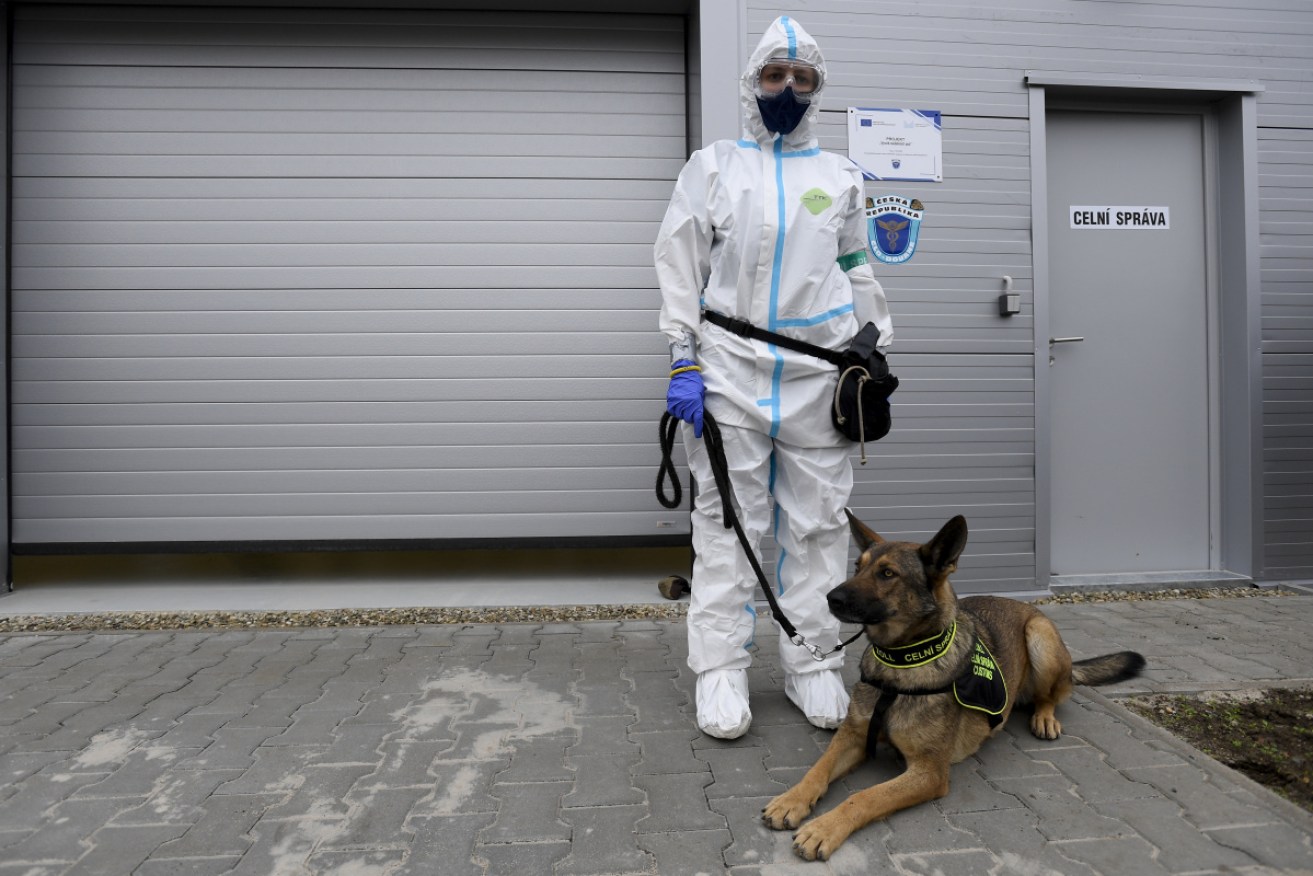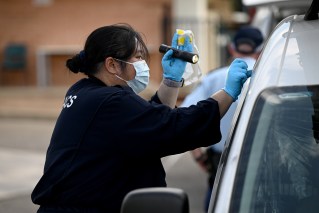Coronavirus stinks: Australian virus-sniffer dogs ready for work by mid-summer


COVID-19 sniffer dogs are already being used in other countries, including the Czech Republic. Australia could soon follow suit. Photo: AAP
Australian researchers are just weeks away from approving the deployment of sniffer dogs who can detect the coronavirus.
The University of Adelaide’s Dr Anne-Lise Chaber, who is helping train the canine team, said the dogs could help authorities at airports and aged-care facilities where many people need to be screened for the virus.
“If you want to screen a lot of people very quickly, this will be a valuable tool,” Dr Chaber said.
She explained that research has found people infected with COVID-19 give off a “special” odour when they perspire.
It isn’t yet known what is different about the smell of a person’s sweat when they catch the virus, just that the dogs can pick it – whatever it is – up, Dr Chaber said.
The University of Adelaide researchers, who are following the lead of the Alfort National Veterinary School in France, collected sweat samples from people with and without the virus by placing a swab under their armpit and leaving it there for 20 minutes.
It has been found that the sniffer dogs can determine if someone has the virus even if they aren’t showing symptoms or have yet to feel ill, Dr Chaber said.
The dogs have been successfully trained to sit when they smell the sweat from a person who is infected, she said.
Now it’s a matter of seeing how accurate they are.
“You’ve got a line of negative samples and you put one positive sample in this line of negative samples and you want to make sure that the dog is going to pick it up,” Dr Chaber told The New Daily.
She said the dogs, which have only been sniffing out COVID-19 in sweat samples, would be ready to be used on humans by early next year.
After researchers release their findings, it will be up to state and federal authorities to deploy the dogs.
Here’s what states told The New Daily:
- The NT government said it was “closely monitoring” the program to see if the dogs could be used “some time in the future”
- NSW Health is “always interested in innovative ways to potentially assist with COVID-19 control, and will watch the results of this program with interest”
- WA said “there is no current plan to use sniffer dogs in WA. However, WA Health will continue to monitor the evidence as it emerges”
- ACT Police said it “currently has no plans to deploy sniffer dogs in this manner” but the state’s health department said it was aware of, and monitoring, the trials and continues to consider different methods of virus detection
- Queensland said “based on current levels of COVID-19 in Queensland, the use of sniffer dogs is not currently needed” but added it welcomed the research
- The Tasmanian government did not respond to questions.
Federal agencies confirmed they would consider using the sniffer dogs as part of their coronavirus defence plans in future, including at airports.
A spokesperson from the Australian Border Force said it has established a project team, which uses the expertise of the ABF Detector Dog Program (DDP), to determine the feasibility of training detector dogs to identify asymptomatic people with COVID-19.
“The DDP is directly contributing to the research being undertaken by the University of Adelaide with a view to advancing the development of an Australian COVID dog capability.”
The spokesperson cautioned that much of the research is still in its early stages.
“The science around COVID dogs is not nearly as conclusive and progressed as often reported in the media with many research projects still in their infancy of development and clinical trials.”

Czech authorities showing the trainee sniffer dogs in November. Photo: AAP
The ABF project team is being supported by domestic and international partners with expertise in human biosecurity, virology and health sciences.
A spokesman for the Department of Agriculture, Water and the Environment said it, too, is actively engaging and contributing to the research at the University of Adelaide.
“The initial research is aimed at better understanding the sensitivity and specificity of the detector dog’s ability to identify COVID-19 positive people within the laboratory environment,” the spokesman said.
“If successful, later stages may seek to test the potential of deployment in operational environments, such as airports and other high traffic locations.”
The Department will “support decision making around any potential operational deployment” once the research is complete.








